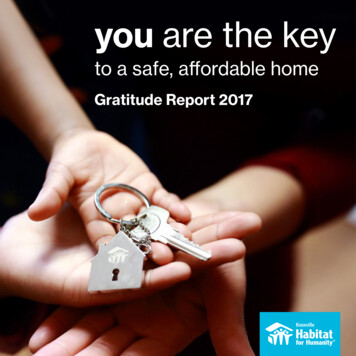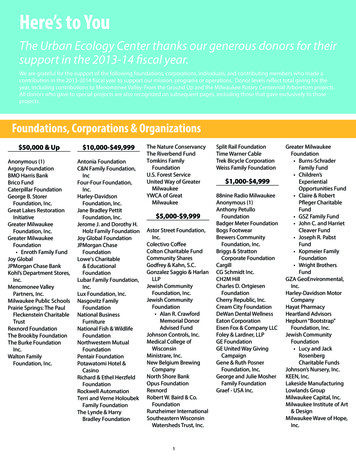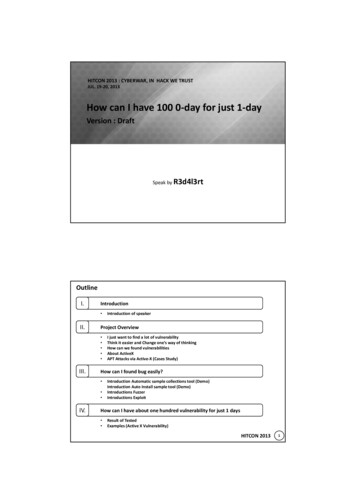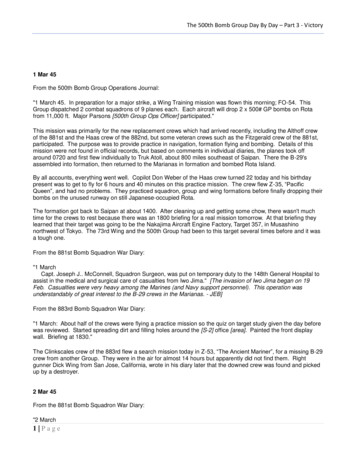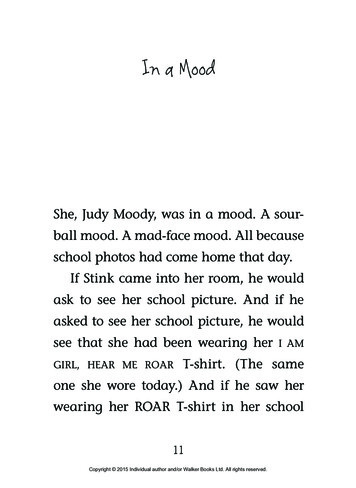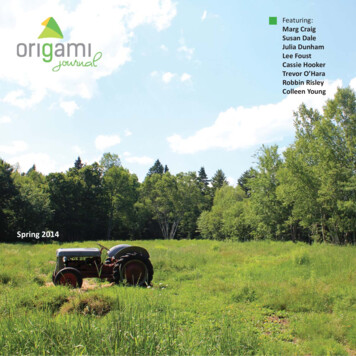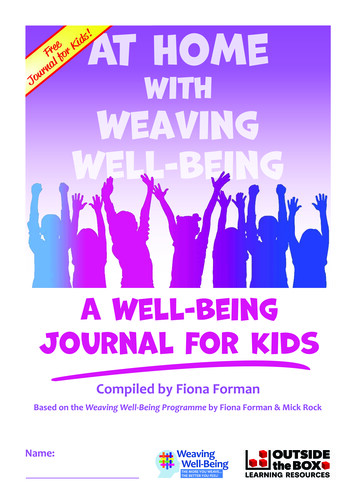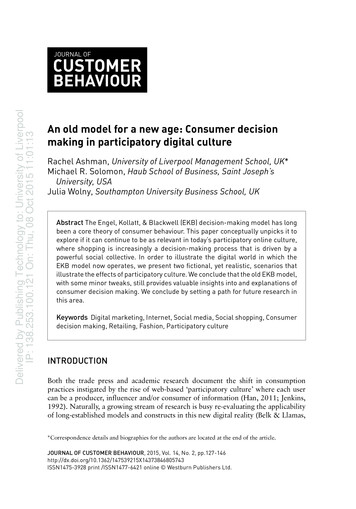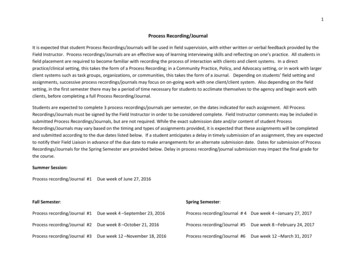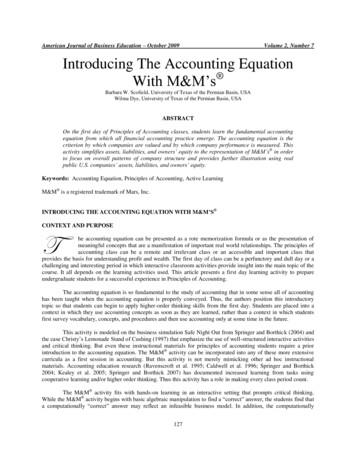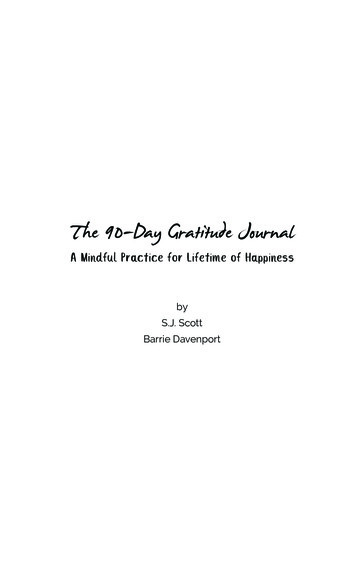
Transcription
The 90-Day Gratitude JournalA Mindful Practice for Lifetime of HappinessbyS.J. ScottBarrie Davenport
The 90-Day Gratitude Journal Copyright 2018by Oldtown Publishing LLCISBN-978-1-946159-15-1All rights reserved. No part of this book may be reproduced in any formwithout permission in writing from the author. Reviewers may quote briefpassages in reviews.DisclaimerNo part of this publication may be reproduced or transmitted in any formor by any means, mechanical or electronic, including photocopying orrecording, or by any information storage and retrieval system, or transmitted by email without permission in writing from the publisher.While all attempts have been made to verify the information providedin this publication, neither the author nor the publisher assumes any responsibility for errors, omissions, or contrary interpretations of the subject matter herein.This book is for entertainment purposes only. The views expressed arethose of the author alone, and should not be taken as expert instructionor commands. e reader is responsible for his or her own actions.Adherence to all applicable laws and regulations, including international, federal, state, and local governing professional licensing, businesspractices, advertising, and all other aspects of doing business in the US,Canada, or any other jurisdiction is the sole responsibility of the purchaser or reader.Neither the author nor the publisher assumes any responsibility or liability whatsoever on the behalf of the purchaser or reader of these materials.Any perceived slight of any individual or organization is purely unintentional.
Why the World Needs More GratitudeDo you often feel surrounded by negativity?Every day, we are bombarded by bad news, politicaldiscord, and catastrophic world events.If those weren’t enough, our inboxes and social mediafeeds are cluttered with updates on the newest diseasethat will kill us, advertisements for products we shouldbuy to feel happy, and all the reasons we aren’t attractive, wealthy, or successful enough.We constantly deal with negativity, yet we are weirdly addicted to the information that is feeding our innerangst and unhappiness.But if you turned off the television, shut down your phone,and closed the lid on your computer, life wouldn’t seemso bad, would it?You have most of what you need and a lot of what youwant in life. There are good things happening all aroundyou. People love you. There’s food on the table. Youhave a bed to sleep in and a roof over your head.1
The antidote to our unhappiness isn’t the newest thing,the latest diet fad, or the next achievement.The antidote is gratitude.Gratitude for what you have right now. Gratitude for thepeople in your life. Gratitude for all good things that areavailable to you in this moment.Being grateful isn’t an idea you stick on a Post-It notefor a quick shot of feel-good. There’s a reason (manyreasons, in fact) why you are hearing it touted so much.Gratitude can transform you. It can pull you from thevortex of negativity that is sucking the life out of you,and give you a renewed sense of purpose and joy.And the simplest way to practice gratitude is to turn itinto a daily habit—specifically through the book you’reholding right now: The 90-Day Gratitude Journal: AMindful Practice for Lifetime of Happiness.The 90-Day Gratitude Journal is your personal tool forinjecting a dose of positivity into your day. You can use itto focus your attention on what is going right in your lifeinstead of focusing on everything that’s going wrong.2
You can use it to pause for a few minutes every day andtruly appreciate all that you have.If you make the commitment to complete the entirejournal, you’ll have a diary of all the wonderful thingsthat you can be thankful for. Whenever you feel frustrated or anxious, you can review this journal and recognizethat life is pretty good.Okay, are you ready to dive in?Let’s talk about the nine benefits of practicing gratitude.3
9 Benef its of Practicing GratitudeStill unsure about how gratitude can help you? Here arenine ways that gratitude will lead to improvements inboth your psychological and physical well-being.#1. Gratitude increases your happiness.When you regularly practice gratitude, you’ll start to notice that you’re surround by an abundance of positivity.These are the things that you may have taken for granted in the past. But when you learn to truly appreciatethem, your levels of happiness will increase.This increase in happiness has been supported by twostudies.First, according to an article in the Harvard HealthyNewsletter [1], which outlines research on the topic,“Gratitude is strongly and consistently associated withgreater happiness. Gratitude helps people feel morepositive emotions, relish good experiences, improvetheir health, deal with adversity, and build strong relationships.”Also, Martin Seligman and his team performed a study[2] where they asked participants to write down “threegood things” that occurred during their day, with an ex4
planation of why each item was personally important.After completing this exercise for a week, the participants reported more happiness (and less depression) atthe one-month, three-month, and six-month follow-upsessions.In short, gratitude makes you happier because you develop an appreciation for everything positive in your lifeinstead of taking it for granted.#2. Gratitude improves your mental health.If you’re tired of feeling anxious, dissatisfied, frustrated,and depressed, then gratitude can be the key to reducing stress and depression.In her book The How of Happiness [3], researcher andpsychologist Dr. Sonja Lyubomirsky states, “Gratitude isan antidote to negative emotions, a neutralizer of envy,hostility, worry, and irritation. It is savoring; it is not takingthings for granted; it is present oriented.”#3. Gratitude helps you savor positive experiences.We all have our favorite memories. Maybe they includemeeting your spouse or partner, seeing the birth ofyour child (or children), celebrating big milestones orachievements, or taking the vacation of a lifetime.5
Unfortunately,oncethoseexperienceshavecome and gone, we rarely take the time to thinkabout how amazing they were. Even when goodthings happen, we are often so distracted thatwe don’t fully experience the joy of that moment.By being engaged in the present moment, you will gainappreciation from every experience. Just remindingyourself to stop and feel grateful gives you a boost andenhances the richness of the occasion.#4. Gratitude helps you cope with major lifechallenges.Trauma, stress, and negative life events can have thecounterintuitive effect of making us feel more grateful.In his book Thanks! How Practicing Gratitude Can MakeYou Happier [4], Dr. Robert Emmon found that in thedays after the 9/11 attacks in the U.S., gratitude was thesecond most commonly felt emotion after sympathy.According to Emmon, “People might have felt gratefulto be alive or to know that their loved ones were safe.”All the positive things in our lives come into sharp focus when something tragic happens to us or around us.When we deal with stress or adversity, gratitude helpsus cope and process our emotions in a healthy way.6
By focusing on the positive aspects of our lives ratherthan allowing ourselves to be overwhelmed by negative events, we feel more in control and optimistic aboutour situation.#5. Gratitude fosters resilience.When you are grateful for what you have, you are better able to overcome negative events in your life. Youdon’t view your life as a “glass half empty,” but rather yourecognize that despite bad things happening, you willsurvive, and even thrive.In fact, gratefulness was shown to be a critical factorin preventing post-traumatic stress disorder in veterans after the Vietnam War, and following the terroristattacks on 9/11.With the practice of gratitude, you build your inner coping muscle, allowing you to manage life’s difficultieswith less emotional trauma.#6. Gratitude boosts your self-esteem.Practicing gratitude allows you to reflect on yourachievements, the important people in your life, andthe blessings you encounter every day. By focusing onthese things, you’re able to see how much you havedone to make good things happen.7
Your hard work has resulted in the house you live in andthe material things you own.Your love, devotion, and presence have helped build astrong and secure family.Your efforts in school and past jobs have landed you inthis career.Expressing gratitude for all your own skills, interests,and achievements will boost your feelings of self-worth.#7. Gratitude fosters empathy.Gratitude inspires you to be less materialistic and moreinclined to help others. As you focus on your own blessings, you become keenly aware of what other peopledon’t have.When you feel grateful for easy access to food and water, you might be inspired to help someone who doesn’t.As you express gratefulness for your wonderful friendships, you might decide to reach out to someone whois lonely.The practice of gratitude has a spillover effect, makingyou more aware of the feelings and suffering of otherslong after you practice it. You become a more compassionate person in general.8
#8. Gratitude gives you a better night’s sleep.Do you often lie in bed wide-eyed, worrying about yourproblems? If so, a simple way to remove your anxietiesis to practice gratitude before bedtime.In fact, one study [5] found that gratitude journaling before bed can reduce worry and pessimism, helping yourelax and fall asleep faster. Some study participants reported getting longer, more refreshing sleep as well.#9. Gratitude strengthens relationships.Do you want a happier, stronger marriage? Focus onyour partner’s good qualities and the positive aspectsof your relationship, rather than dwelling on what’smissing. Do you want closer friendships? Let your friendsknow how much you appreciate them, and howgrateful you are to have them as friends. Do you want more success at work? Tell your bossand coworkers how thankful you are for their support and hard work. You don’t even need to tell people you’re grateful(although it’s a nice thing to do) in order to benefit.Just feeling gratitude for these people will improveyour relationships with them.9
Gratitude strengthens feelings of intimacy and connectedness with others. The closer you feel with theimportant people in your life, the more you will discoverand enjoy about them—which in turn gives you more tofeel grateful about.Having close, satisfying relationships is a huge factor inlifelong happiness and health.As you can see, you’ll enjoy many benefits by regularlypracticing gratitude. Now let’s talk about how to incorporate this habit into your busy schedule.10
11
How to Buildthe Gratitude Journaling HabitIt’s not hard to create the gratitude journaling habit. Allyou have to do is schedule this activity and use simplehabit-building strategies to make sure you never missa day.Both authors (Steve “S.J.” Scott & Barrie Davenport) talkextensively about creating habits on their websites, butfor now, here’s an overview of the simple seven-stepprocess.Step #1: Focus on Building Just the Gratitude HabitOne common mistake is trying to build multiple habitsat the same time. This problem relates to “ego depletion,” which is a person’s “diminished capacity to regulate their thoughts, feelings, and actions,” accordingto the book Willpower, by Roy F. Baumeister and JohnTierney [6].Our willpower is like a muscle. It weakens throughoutthe day because of constant use. You use your willpower when you make dozens of decisions each day. Youuse your willpower to concentrate at work. You use willpower to resist eating junk food. And you use willpower12
to resist lashing out at others when you’re tired from along day of work.Because of ego depletion, your ability to form new habits is limited since there are only so many “new” thingsyour willpower can handle at once. To keep things easy,we strongly recommend that you work on building justthe gratitude practice for the next month, increasing thelikelihood that you’ll make this habit stick!Step #2: Commit to Thirty (or More) Daysof GratitudeGratitude will help you gain a new appreciation for life.But this doesn’t mean it will be a simple or quick process. In fact, it might take you a few attempts to turnjournaling into permanent behavior.Some people say it takes twenty-one days to build ahabit, while others claim it takes up to sixty-six days.The truth is that the length of time varies from personto person and from habit to habit. You’ll find that somehabits are easy to build, while others require more effort.Our advice is to commit to gratitude for the next thirtydays at a minimum.We recommend that you schedule a daily block of timeof at least five to ten minutes to write in this journal.13
Step #3: Anchor Gratitude to an Established HabitPracticing gratitude shouldn’t be based upon motivation,fads, or temporary desire. Rather, it should be integratedin your life in a way that allows the behavior to becomeautomatic. To do this, you don’t need a series ofsophisticated steps—just a simple strategy you cancommit to, day in and day out, without fail.We suggest that you “anchor” the gratitude journaling practice to habits that you already do daily. Thesehabits should be automatic on your part—like eating,sleeping, or going to the bathroom. You wouldn’t forgetto complete any of these actions, so by attaching yourgratitude habit to one of them, you won’t forget to perform it.When anchoring, your goal is to practice gratitude before or after you complete one of these habits: Drinking your first cup of tea (or coffee) in themorning. When your alarm clock goes off. When you get into bed in the evening (you can alsocreate a visual cue by leaving this journal on yournightstand). Before or after you finish a specific meal (breakfast,lunch, or dinner).14
When you walk into a specific room for the first time(e.g., your den or home office).There are countless options for picking an establishedhabit. The trick is to identify an action you do every single day and attach gratitude journaling to it. When youpick the right habit, you’ll discover that it’s not hard toturn gratitude into an automatic behavior.Step #4: Track the Gratitude HabitIt’s not enough to anchor gratitude to another habit—you also need a mechanism to reinforce this behaviordaily.The simplest tool for building reinforcement is yourmobile phone (since it’s a device most people have onthem throughout the day). We suggest that you installone of three apps, and use it to create reminders forpracticing the gratitude habit. Strides (http://www.stridesapp.com): Strides hasa clean, simple interface that allows you to trackall your habits and goals. It’s currently the app thatSteve uses to manages all his personal habits. Coach.me (https://www.coach.me): This is anothergreat tool. Not only can you use it to stick to yourhabits, you can also connect with a coach to help15
you build a specific habit. Chains (https://chains.cc): Chains is built on JerrySeinfeld’s “never break the chain” concept [7], whereyou commit to a specific habit and never miss a day,creating a chain of positive behaviors in your life.Finally, if you’re not interested in downloading a wholenew app, then you can also set a reminder to practicegratitude using one of these popular tools: Google Calendar (https://calendar.google.com) Evernote (https://evernote.com) Todoist (https://todoist.com)Regardless of the tool you pick, we recommend keeping track of your gratitude journaling habit by usingsome type of tool. You’ll be surprised at how often thebehavior of “checking in” makes the difference betweenwhether you do or do not practice gratitude for the day.Step #5: Plan for Potential ObstaclesWith any new habit, you’ll face obstacles—even gratitude journaling. While this practice might seem simpleto complete, there will be those days when it seems impossible to carve out an extra 5-10 minutes.You’ll probably encounter obstacles like:16
Not having enough time. Feeling too self-conscious with certain prompts. Forgetting to pack The 90-Day Gratitude Journal fora vacation. Feeling too angry (or sad, upset, stressed, etc.) topractice gratitude. Struggling to think of unique ways to express gratitude.The key to overcoming (or even preventing) these obstacles is recognizing that they happen to all of us. Onceyou do, you can create a specific plan for how you’llhandle each of the challenges that you frequently experience.We recommend you create “if-then statements” for theactions you’ll take when certain challenges arise.Here are a few examples: “If I keep forgetting to practice gratitude, then I willschedule this habit for earlier in the day where I havemore time.” “If I can’t think of anything to be grateful for whenjournaling, I’ll write down ideas as they come to methroughout the day.” “If I have a bad day and don’t feel in the mood tojournal, then I will simply focus on trying to find just17
one positive thing to write about.” “If I forget my journal, then I will keep a list of reasons to be grateful on my cell phone, and updatethe journal when it’s available.” “If I find myself stressed or angry at the world, thenI will pause for a few seconds to look for somethingpositive about how I’m currently feeling.”When you have a plan, you can overcome any obstaclethat comes your way, and know how you’ll respond toeach situation.Step #6: Practice Gratitude Throughout the DayOne the key strategies for habit development is takingsmall steps when building new behaviors, and we’vedesigned The 90-Day Gratitude Journal to be as easyas possible. Each day, you’ll respond to three simpleprompts, which take no more than ten minutes to complete.That said, to gain the full benefit of gratitude, you shouldconsider practicing throughout the day—especiallywhen you’re anxious or stressed. That’s why we inviteyou to practice gratitude whenever you: Feel anger at an insignificant event. Get annoyed during a daily commute.18
Get into an argument with an important person inyour life. Are enjoying a small moment with a friend or familymember. Encounter a particularly challenging obstacle. Are using a piece of technology that is frustratingyou.There are countless ways to experience gratitude inyour life. The trick is to pause for a few seconds andthink about what is wonderful at that very moment.Step #7: Reward Yourself for ConsistencyPracticing gratitude should be a rewarding experience.Not only can you gain an appreciation for what’s great inyour life, you can also create a reward system based onthe number of days you’ve successfully practiced thisbehavior.For example, you could reward yourself whenever youhit important milestones. You could: Go see a movie after practicing gratitude for oneweek. Enjoy a date night out with your significant other after a month.19
Go on a weekend getaway after six months of gratitude. Splurge on an expensive treat after a year.You get the picture.Really, the rewards themselves don’t matter. What’s important is creating positive reinforcement for practicinggratitude every single day.If you get stuck, we recommend reading Steve’s articlethat covers 155 ways to reward yourself: Now that you understand why gratitude is important,and how to turn it into a daily habit, so let’s go over thethree prompts that are included in this journal so youcan get started writing in it.20
How to UseThe 90-Day Gratitude JournalIn this 90-day journal, you’ll answer three questions,which won’t take more than ten minutes of your time.Two of the prompts will be the same every day, but thethird will be a “wild card” question that challenges youto think about a specific aspect of your life.Let’s go over each of the three prompts and why they’reimportant.Question 1: “I am grateful for, because.”This question is based on a study by Martin Seligman[8] that confirmed that the best way to express gratitudeis to not only describe what you’re grateful for, but alsoto take the time to consider the actions that led to thisgood result. When you start to see a positive correlationbetween your actions and certain events, you’ll do moreto attract these good things into your life.The purpose here is to challenge you to be ultra-specific about what you’re currently grateful for. This meansyou’ll describe how a person, event, or item has benefited your life, and in what ways you have been helped.21
There are many things to be grateful for: Specific people in your life. Even with someone whoannoys or angers you, there is always a lesson to belearned from every interaction you have with others. Certain possessions. You can journal about itemsthat have enriched your life or made it better insome way. Things you take for granted. There are many people,possessions, or conditions in your life right now thatyou might take for granted—like your health, job, relationships, or even a piece of technology. A greatway to express gratitude is to recognize how yourlife would be different if you didn’t have one of thesespecific items. Random surprises. One of the best ways to feelgrateful is by taking the time to recognize the unexpected, positive events that occur. Small moments. Sometimes the best things to begrateful for are those everyday experiences. Playingwith your children. A warm summer day. The tasteof your favorite beverage. Taking time to appreciatethese moments will help you value every single experience.22
To show how this prompt works, here is an item thatSteve journaled about recently:“I am grateful for the 1812 Overture by PyotrTchaikovsky, because listening to itat the end of my run got me throughthose difficult last two miles.”Sure, this might seem like a small thing to be gratefulfor, but that’s the idea—you should constantly look atthe world around you and acknowledge all that’s wonderful in your life.Finally, we challenge you to come up with a unique answer for every day you journal. That way, you’ll have anongoing list of all the items and people that have addedvalue to your existence. You can then review this journalwhenever you feel the need for an emotional boost.Question #2:“What am I looking forward to today (or tomorrow)?”This question should be easy to answer.If you’re journaling in the morning, write down one thingthat you’re looking forward to doing by the end of theday. It could be spending time with someone important,23
working on a fun project, or simply relaxing at the endof the day.If you prefer to journal in the evening, then journal aboutsomething you’re excited about for tomorrow.Don’t overthink your response here. Just pick one thingthat will be wonderful about the next 24 hours.Question #3: Unique, specific questions.The last question is a “wild card” prompt. Each day, youwill be asked a unique question about an aspect of yourlife.We cover a variety of topics with this question, including specific people in your life, favorite memories, challenges you’ve overcome, and common items you’vetaken for granted.Also, on every 10th day, the prompt will ask you to listten responses to a simple question related to gratitude.For question #3, we challenge you to write as much information as you’d like. We have provided a half page ofwhite space where you can journal a detailed response.Feel free to put as much (or as little) as you’d like in thissection.24
That’s a brief overview of the three questions you’ll findwithin the journal. Let’s begin your gratitude journey bystarting with Day 1.25
DAY 1DATE//When you are grateful, fear disappears and abundance appears.— TONY ROBBINSQuestion #1: “I am grateful for, becauseQuestion #2: “What am I looking forward to today (or tomorrow)?”Question #3: Describe your happiest childhood memory.26.”
DAY 2DATE//Act with kindness, but do not expect gratitude.— CONFUCIUSQuestion #1: “I am grateful for, becauseQuestion #2: “What am I looking forward to today (or tomorrow)?”Question #3: What is a popular song that you enjoy (and why doyou like it)?27.”
DAY 3DATE//Develop an attitude of gratitude. Say thank you to everyone youmeet for everything they do for you.— BRIAN TRACYQuestion #1: “I am grateful for, becauseQuestion #2: “What am I looking forward to today (or tomorrow)?”Question #3: What is one of your favorite songs from yourchildhood?28.”
DAY 4DATE//An attitude of gratitude brings great things.— YOGI BHAJANQuestion #1: “I am grateful for, because.”Question #2: “What am I looking forward to today (or tomorrow)?”Question #3: Who is the one friend you can always rely on?29
DAY 5DATE//Stop now. Enjoy the moment. It’s now or never.— MAXIME LAGACÉQuestion #1: “I am grateful for, becauseQuestion #2: “What am I looking forward to today (or tomorrow)?”Question #3: What is the biggest accomplishment in yourpersonal life?30.”
DAY 6DATE//When gratitude becomes an essential foundation in our lives,miracles start to appear everywhere.”— EMMANUEL DALGHERQuestion #1: “I am grateful for, becauseQuestion #2: “What am I looking forward to today (or tomorrow)?”Question #3: What is the biggest accomplishment in yourprofessional life?31.”
DAY 7DATE//The essence of all beautiful art is gratitude.— FRIEDRICH NIETZCHEQuestion #1: “I am grateful for, becauseQuestion #2: “What am I looking forward to today (or tomorrow)?”Question #3: What is your favorite memory of your father(or stepfather)?32.”
DAY 8DATE//The smallest act of kindness is worth more thanthe grandest intention.— OSCAR WILDEQuestion #1: “I am grateful for, becauseQuestion #2: “What am I looking forward to today (or tomorrow)?”Question #3: What is your favorite memory of your mother(or stepmother)?33.”
DAY 9DATE//No duty is more urgent than that of returning thanks.—Question #1: “I am grateful forJAMES ALLEN, becauseQuestion #2: “What am I looking forward to today (or tomorrow)?”Question #3: Describe your favorite pet (or former pet)?34.”
DAY 10DATE//Gratitude changes everything.— ANONYMOUSQuestion #1: “I am grateful for, becauseQuestion #2: “What am I looking forward to today (or tomorrow)?”Question #3: List 10 hobbies and activities that bring youjoy?35.”
DAY 11DATE//Gratitude makes sense of your past, brings peace for today, andcreates a vision for tomorrow.— MELODY BEATTIEQuestion #1: “I am grateful for, becauseQuestion #2: “What am I looking forward to today (or tomorrow)?”Question #3: What is a mistake that you’ve made and thatultimately led to a positive experience?36.”
DAY 12DATE//The highest tribute to the dead is not grief but gratitude.— THORNTON WILDERQuestion #1: “I am grateful for, becauseQuestion #2: “What am I looking forward to today (or tomorrow)?”Question #3: Describe a family tradition that you are mostgrateful for.37.”
DAY 13DATE//True forgiveness is when you can say, Thank you for that experience.— OPRAH WINFREYQuestion #1: “I am grateful for, because.”Question #2: “What am I looking forward to today (or tomorrow)?”Question #3: Who is a teacher or mentor that has made animpact on your life, and how did they help you?38
DAY 14DATE//Nothing new can come into your life unless you aregrateful for what you already have.— MICHAEL BERNHARDQuestion #1: “I am grateful for, because.”Question #2: “What am I looking forward to today (or tomorrow)?”Question #3: What do you like the most about your town orcity?39
DAY 15DATE//Appreciation is a wonderful thing: It makes what is excellentin others belong to us as well.— VOLTAIREQuestion #1: “I am grateful for, becauseQuestion #2: “What am I looking forward to today (or tomorrow)?”Question #3: Describe your favorite location in your houseand why you like it.40.”
DAY 16DATE//There is always something to be grateful for.— ANONYMOUSQuestion #1: “I am grateful for, becauseQuestion #2: “What am I looking forward to today (or tomorrow)?”Question #3: What is one thing you’ve learned this weekthat you’re thankful for?41.”
DAY 17DATE//Nothing is more honorable than a grateful heart.—Question #1: “I am grateful forLUCIUS ANNAEUS SENECA, because.”Question #2: “What am I looking forward to today (or tomorrow)?”Question #3: Who made you smile in the past 24 hours andwhy?42
DAY 18DATE//Gratitude; my cup over f loweth.— OSCAR WILDEQuestion #1: “I am grateful for, becauseQuestion #2: “What am I looking forward to today (or tomorrow)?”Question #3: What is a recent purchase that has addedvalue to your life?43.”
DAY 19DATE//Hope has a good memory, gratitude a bad one.— BALTASAR GRACIANQuestion #1: “I am grateful for, becauseQuestion #2: “What am I looking forward to today (or tomorrow)?”Question #3: What is biggest lesson you learned in childhood?44.”
DAY 20DATE//There are always f lowers for those who want to see them.— HENRI MATISSEQuestion #1: “I am grateful for, becauseQuestion #2: “What am I looking forward to today (or tomorrow)?”Question #3: List 10 ways you can share your gratitudewith other people in the next 24 hours.45.”
DAY 21DATE//Happiness is itself a kind of gratitude.— ANONYMOUSQuestion #1: “I am grateful for, becauseQuestion #2: “What am I looking forward to today (or tomorrow)?”Question #3: Describe your favorite smell.46.”
DAY 22DATE//“Living in a state of gratitude is the gateway to grace.— ARIANNA HUFFINGTONQuestion #1: “I am grateful for, becauseQuestion #2: “What am I looking forward to today (or tomorrow)?”Question #3: Describe your favorite sound.47.”
DAY 23DATE//My day begins and ends with gratitude.— LOUISE HAYQuestion #1: “I am grateful for, becauseQuestion #2: “What am I looking forward to today (or tomorrow)?”Question #3: Describe your favorite sight.48.”
DAY 24DATE//Walk as if you are kissing the earth with your feet.— THICH NHAT HANHQuestion #1: “I am grateful for, becauseQuestion #2: “What am I looking forwa
In his book Thanks! How Practicing Gratitude Can Make You Happier [4], Dr. Robert Emmon found that in the days after the 9/11 attacks in the U.S., gratitude was the second most commonly felt emotion after sympathy. According to Emmon, “People might have felt grateful
